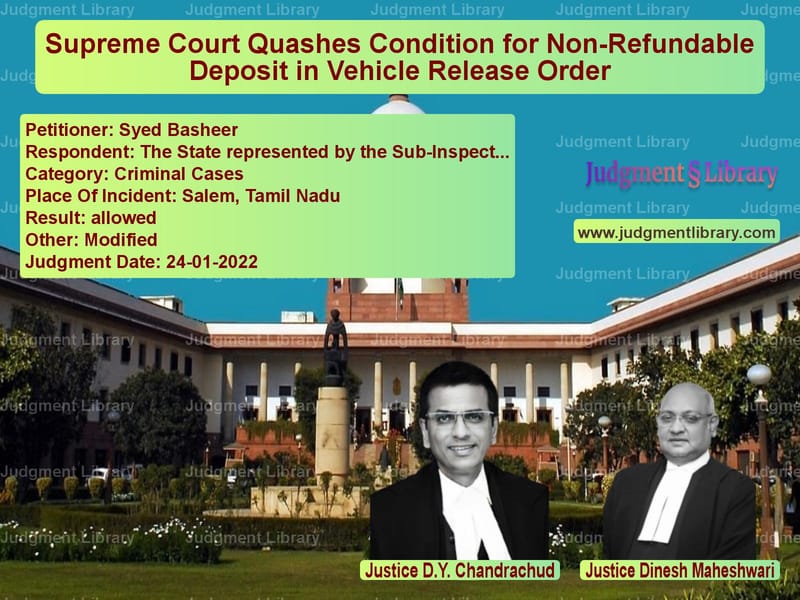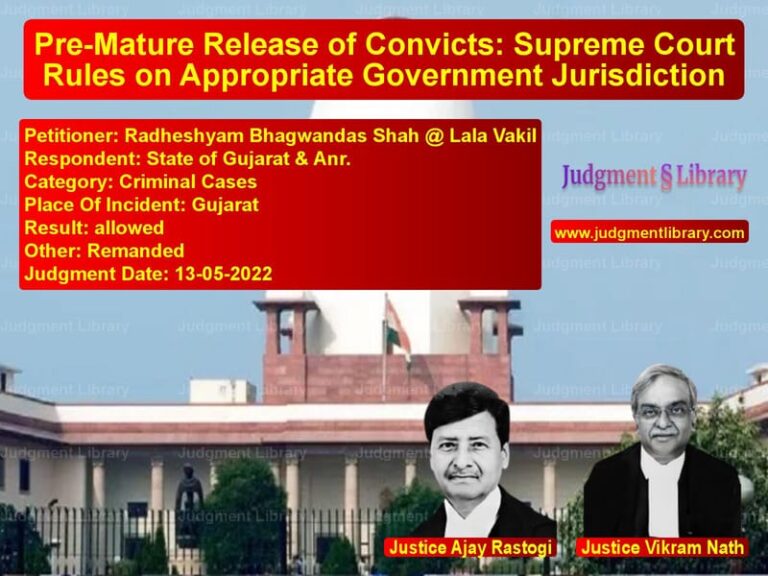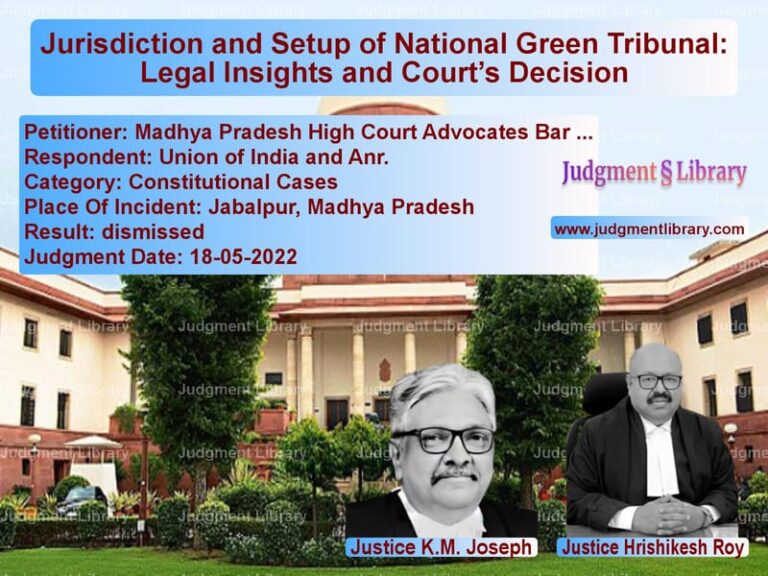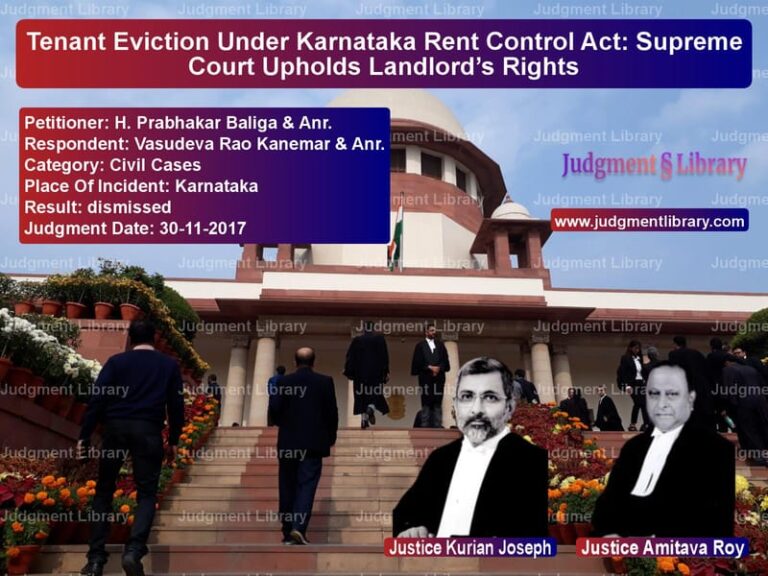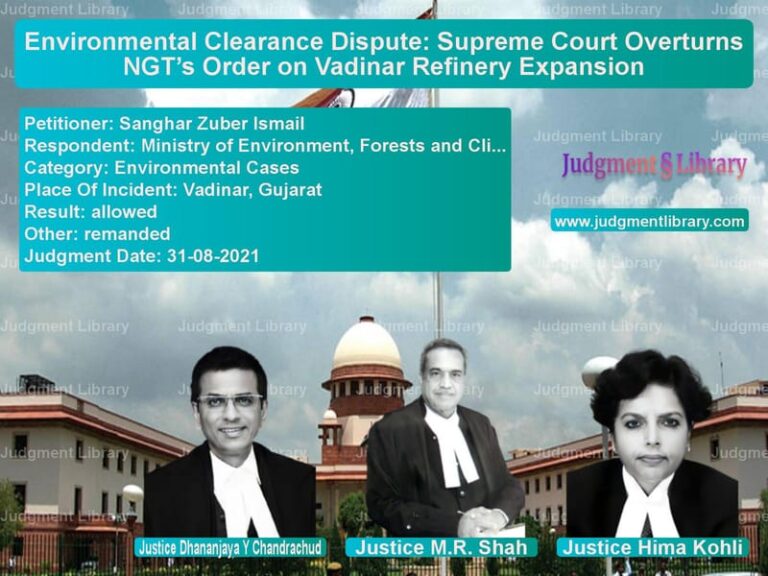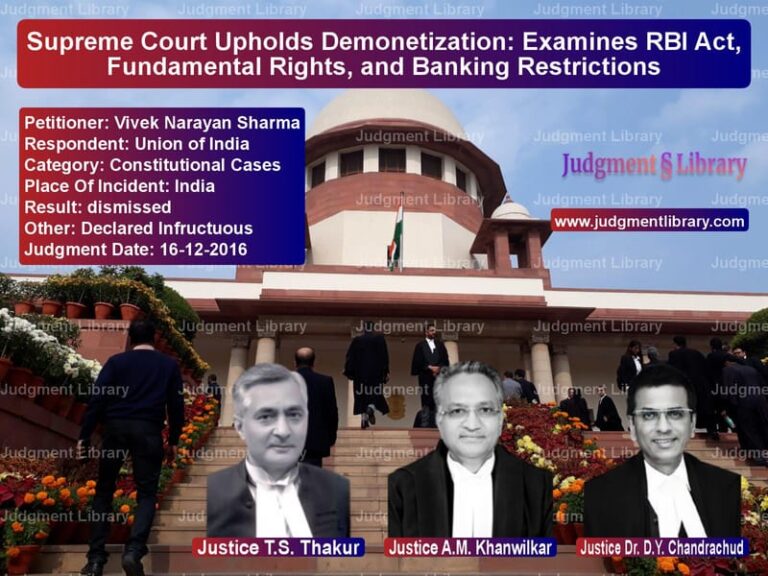Supreme Court Quashes Condition for Non-Refundable Deposit in Vehicle Release Order
The Supreme Court of India recently ruled in Syed Basheer vs. The State represented by the Sub-Inspector of Police, striking down a condition imposed by the Madras High Court that required a non-refundable deposit of Rs. 1 lakh for the release of a seized vehicle. The judgment reaffirms the principle that judicial orders must be grounded in statutory provisions and cannot impose arbitrary conditions.
Background of the Case
The case originated when the petitioner, Syed Basheer, filed a criminal revision petition before the High Court of Judicature at Madras challenging the order of the Judicial Magistrate No. 2, Salem, dated August 23, 2021. The case pertained to a TATA 407 (Turbo) Tempo bearing Registration No. KA-01-C-8853, which was seized in connection with Case Crime No. 178/2021 registered at Karuppur Police Station. The vehicle was alleged to have been used for the illegal transportation of liquor bottles.
The High Court, by its order dated September 29, 2021, directed the Judicial Magistrate to release the vehicle upon fulfillment of several conditions. The petitioner was required to produce the original registration certificate, ensure the vehicle was not altered, provide an undertaking that it would not be used for illegal activities, and participate in confiscation proceedings. Additionally, the High Court imposed a non-refundable deposit condition, requiring the petitioner to pay Rs. 1 lakh to the Chief Minister’s Public Relief Fund.
Aggrieved by this condition, the petitioner approached the Supreme Court.
Arguments by the Petitioner (Syed Basheer)
- The petitioner argued that the imposition of a non-refundable deposit was arbitrary and without any legal basis.
- He contended that the release of a seized vehicle should be governed by statutory provisions and that no such requirement was prescribed under the Criminal Procedure Code (CrPC) or other relevant laws.
- The petitioner maintained that the High Court had exceeded its jurisdiction by imposing a financial penalty unrelated to the merits of the case.
Arguments by the Respondents (State of Tamil Nadu)
- The State defended the High Court’s order, arguing that the non-refundable deposit was intended to ensure compliance and discourage illegal activities.
- It contended that courts have wide discretionary powers while granting relief and imposing conditions to prevent misuse of judicial orders.
- The State maintained that such deposits have been required in past cases to deter repeated offenses.
Observations of the Supreme Court
The Supreme Court, comprising Justices D.Y. Chandrachud and Dinesh Maheshwari, ruled in favor of the petitioner, striking down the condition for the Rs. 1 lakh non-refundable deposit.
The Court observed:
“While the High Court was justified in directing the release of the vehicle and imposing conditions to prevent its misuse, there was no statutory warrant for requiring the petitioner to make a non-refundable deposit as a condition for release.”
The Court further stated:
“Such a direction was not based on any statutory provision and was hence not warranted. The power of the judiciary is circumscribed by law, and no condition can be imposed unless explicitly authorized by a legal provision.”
In rejecting the State’s defense, the Court clarified:
- Courts cannot impose monetary conditions beyond statutory prescriptions.
- Judicial discretion must be exercised within legal parameters and should not amount to an arbitrary imposition.
- The High Court’s intent to deter illegal activities cannot override the necessity of a statutory foundation for such conditions.
Final Judgment
- The Supreme Court quashed the condition requiring a Rs. 1 lakh non-refundable deposit.
- The order of the Madras High Court was modified to exclude the impugned condition.
- All other conditions regarding vehicle release remained unchanged.
- The appeal was allowed, and the petitioner was granted relief.
Implications of the Judgment
- The ruling reinforces that judicial orders must adhere to statutory mandates.
- It prevents the imposition of arbitrary financial conditions that lack legislative backing.
- The judgment serves as a precedent in cases involving the release of seized vehicles and similar legal matters.
- It underscores the principle that courts cannot introduce penalties disguised as conditions for granting relief.
Petitioner Name: Syed Basheer.Respondent Name: The State represented by the Sub-Inspector of Police.Judgment By: Justice D.Y. Chandrachud, Justice Dinesh Maheshwari.Place Of Incident: Salem, Tamil Nadu.Judgment Date: 24-01-2022.
Don’t miss out on the full details! Download the complete judgment in PDF format below and gain valuable insights instantly!
Download Judgment: syed-basheer-vs-the-state-represente-supreme-court-of-india-judgment-dated-24-01-2022.pdf
Directly Download Judgment: Directly download this Judgment
See all petitions in Bail and Anticipatory Bail
See all petitions in Fraud and Forgery
See all petitions in Judgment by Dhananjaya Y Chandrachud
See all petitions in Judgment by Dinesh Maheshwari
See all petitions in allowed
See all petitions in Modified
See all petitions in supreme court of India judgments January 2022
See all petitions in 2022 judgments
See all posts in Criminal Cases Category
See all allowed petitions in Criminal Cases Category
See all Dismissed petitions in Criminal Cases Category
See all partially allowed petitions in Criminal Cases Category

